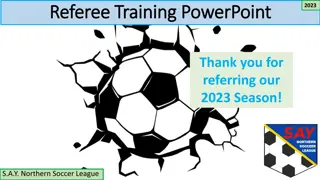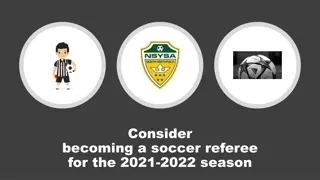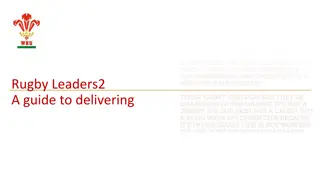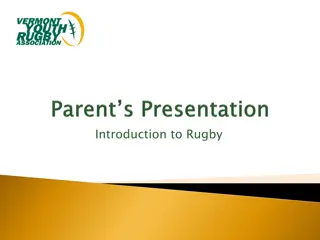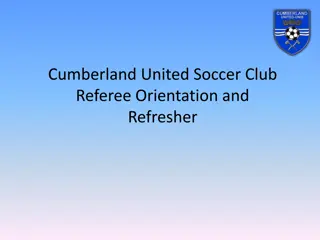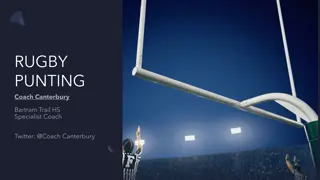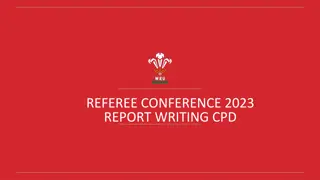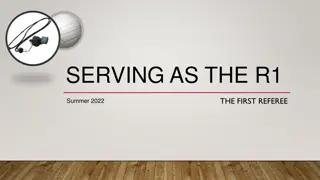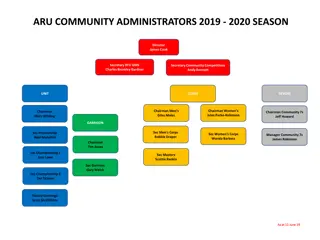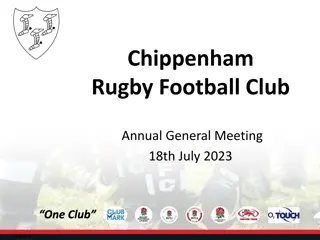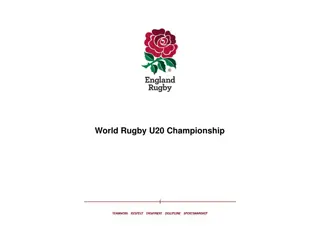Understanding Referee Role in Rugby Sevens
Rugby Sevens is all about speed, entertainment, and quick decision-making. This guide covers the essential aspects of the referee's role, including ensuring fair play, managing breakdowns, and penalizing fouls. It emphasizes the need for clear communication, accurate rulings, and promoting a fast-paced, dynamic game.
Download Presentation

Please find below an Image/Link to download the presentation.
The content on the website is provided AS IS for your information and personal use only. It may not be sold, licensed, or shared on other websites without obtaining consent from the author. Download presentation by click this link. If you encounter any issues during the download, it is possible that the publisher has removed the file from their server.
E N D
Presentation Transcript
WRRA Sevens Presentation 2016/17
Intro to 7s 7's all about speed, entertainment, throwing the ball around, tries, very quick ball, a game where seconds are important The concept is to speed up the game and to indicate that the referee is there to get things done.
Role of the Referee Ensure any delays in play are not caused by the referee. Rule accurately on clear and obvious offences. To be ball in line. Promote and manage a contest at the breakdown. The aim of the breakdown is Quick Ball.
Breakdowns A majority of infringements at the breakdown are material with an impact on the contest for possession Clear physical contact over the ball Entry Should be via the gate Tacklers - Must release player and ball and roll away. Off Feet Players from either team who seal off by driving in low and do not support their own weight are liable to sanction. Squeeze Ball If this tactic is used, the ball must be made available Immediately. Illegal Charging In - Clearing out with no attempt to bind is to be treated as dangerous play
Tackle Recognize the picture Be in a position to be accurate Communicate any offence clearly Recognize trends Penalize negative, cynical play Note: Offside : Tackle vs Ruck
Advantage Advantage can be: Territorial or Tactical. Territorial - a gain in ground. Tactical - freedom for the non-offending team to play the ball as they wish.
Communication Short, sharp communication - less is best. Cut out white noise and chat that does not add value to the game. Signal Crisp/clear and, if necessary repeated. Back Chat - Do not tolerate it under any circumstances.
Forward Pass Non-detection is an advantage for the team in possession of the ball: An undetected forward pass in Sevens is very likely to result in a try. But calls must be only made on Clear and Obvious passes Being ball in line is crucial.
Foul & Cynical Play Dangerous Tackle -Lifting -High -In the air Not making the ball available Deliberate knock on Not back 10m
Scrum Keep the SH focussed on credible throw ins. FK is necessary Engagement - manage firmly. Watch for props pulling back Offside 5m Binding-Hooker has to bind on both their props and the props have to bind on their hooker. Kick through---penalty kick Hookers---deal with early strike and feet in tunnel Scrum end---watch for holding in (attack team)
Lineout Defending Hooker (must be 2m x 2m.) Lot Less formed line-outs Ball going 5m short lineouts
KICKS Restarts - vigilance on chasers being behind kicker (inc wide out chasers) Kicks at goal - Taken of the Field of Play unless directly in front of the posts (30 seconds). Quick taps allow non offending team to continue quickly Ensure tap is taken correctly e.g. kicked.
The Coaches Debrief Process Short, sharp and brutal Highlight positives as well as where improvement is needed If possible let the referee solve issues Focus on outcomes but not at the expense of law/management Talk about things that matter and the clear & Obvious Conclude with objectives for the next game (s)
Summary 7's all about speed, entertainment, throwing the ball around, tries, very quick ball, a game where seconds are important. The concept is to speed up the game and to indicate that the referee is there to get things done.


